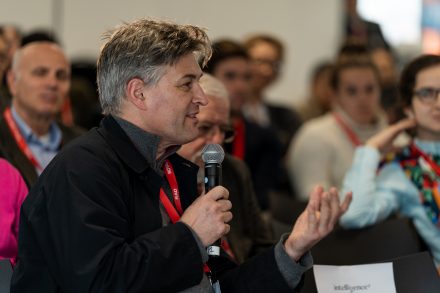The ‘New Economy, Meet New City’ two-day conference in December 2019, hosted at the new Royal Albert Dock development, looked at how technology is impacting ‘the New Economy’, and how tech advancements are reshaping our future in ‘Meet New City’. It was programmed and produced by Intelligence Squared on behalf of ABP (London), developers of the Royal Albert Dock scheme.

New Economy…
Highlights included Carl Miller of Demos (@carljackmiller) on the idea of ‘democracy as living, as a piece of evolving social technology’, and the need to change democracy ‘so people feel they have more in common than they do’, not least in Newham, which he claimed is the home of much innovation. He also noted that we have not yet been unable to translate the power of digital media to bring people together.
The highlight of the ‘Will Fintech Kill the Banks?’ session was financial technology expert Liz Lumley (@LizLum), who used her many decades of watching the sector to bring a historical perspective, and refusal to believe the hype. She was sanguine about the disruption we were seeing, noting that ‘fintech founders I meet worked at a bank, saw a problem, left to develop it, then sold [the resulting company] back to the bank they worked for’. Reflecting on the desire to disrupt, she argued that ‘a secure, regulated bank account is a cornerstone of a civilisation’.
In the ‘Blockchain: Paradigm Shift or Passing Fad?’ author David Gerard (@davidgerard), author of ‘Attack of the 50 Foot Blockchain’ again brought a rigorous skepticism, this time about claims by organisations, to gain credibility, that there were using the ‘distributed ledger’ technical model. ‘Ensure you are solving a problem by using Blockchain’ he cautioned.
… Meet New City
Discussing ‘Jobs of the Future: Automation and a Post-Work World’ writer and activist Paul Mason (@paulmasonnews) was able to bring his rich life experience to contrast the nature of work today to the ‘factory system’ of the past and reflect on the cultural value of work. He was also interesting on the challenge of the collapsing cost of production, which he wrote about in his book ‘Post-Capitalism’. Technologist Nina Schick (@ninadschick) was interesting on the possibility to increase the potential of low-skilled workers using artificial intelligence. The highlight of the five interactive showcases was Peter Dowds, co-founder of social care provider Elder. He noted that the idea of a care home is nineteenth-century, and focuses on safety at any cost with ‘a bubble wrap mentality’. Instead, we should focus on quality not just quantity of life. He rued the warehousing of the elderly, noting that ‘people live for the life they’ve spent their whole lifetime building’, and advocated for more housing stock that allows people to continue to live in their own home. He concluded that we should make caring a vocation.
On ‘The Mobility Revolution: What Will the Hi-Tech City of the Future Look Like?’ academic London School of Economics Tony Travers brought a historical perspective to a future focus. He noted that railways allowed people to escape ‘the dark, dank city’ into Metroland, but later allowed ‘green types’ to move into the city and ‘downtowns’. He was also sanguine about how we manage logistics, asking ‘Is the 20 tonne truck on the pavement delivering milk to a Tesco the best way?’. Following on, Charlie Wren, UK operations director at Deliveroo, considered the question of how we can solve the logistical issue of vehicles arriving in London full and leaving empty, and argued that drone and street robots don’t work in cities (but might in rural areas). On Deliveroo’s own challenges he noted the challenge of incentivising people to order at other times than mealtimes. He also argued that we need an environment and ecosystem in which things can be tested and regulated over time.
The quality of the debate was also enhanced by some excellent chairing, particularly from science journalist Anjana Ahuja and Oxford University and London Business School academic Linda Yueh (@lindayueh).
The showcase of innovative companies and organisations was also valuable, particularly social care robotics developer Consequential Robotics, which is trying to create a humane and smart way of supporting people using networked ‘devices’ in this case taking the form of a pet.
Documentation
See Tweets tagged #NewEconomyNewCity

[Notes] [Tasks]
